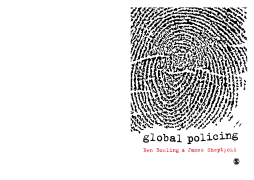
Additional Information
Book Details
Abstract
In the transitional networked society, police power is no longer constrained by the borders of the nation state. It has globalised. Global Policing shows how security threats have been constructed by powerful actors to justify the creation of a new global policing architecture and how the subculture of policing shapes the world system.
Demonstrating how a theory of global policing is central to understanding global governance, the text explores:
- the 'new security agenda' focused on serious organised crime and terrorism and how this is transforming policing
- the creation of global organisations such as Interpol, regional entities such as Europol, and national policing agencies with a transnational reach
- the subculture of the 'global cops', blurring boundaries between police, private security, military and secret intelligence agencies
- the reality of transnational policing on the ground, its effectiveness, legitimacy, accountability and future development.
Written by two leading international experts who bring cutting-edge theoretical debates to life with case studies and examples, Global Policing will prove captivating reading for students and scholars in criminology, criminal justice, international relations, law and sociology.
This outstanding study emphasizes how global policing represents a vast web of power within which coercion and surveillance are conducted by policing agents, who not only operate with increasing global mobility, but who are also connected by technology, complex institutional links and shared subcultural values. In Global Policing, Bowling and Sheptycki have made an invaluable contribution to debates of policing, as well as to those of global governance. With wide interdisciplinary relevance, this book will lend itself to both the researcher and the student.
Conor O’Reilly
Written in a very accessible style, (the discussion regarding Policing and the Social Contract in Chapter 1 is one of the most succinct yet informative pieces I have read on what can be a very complex matter) and from authors with established pedigree within the field, this book will fill in many gaps for readers in this topic, whether they are academics, students, or police practitioners. Despite being a relatively slim volume for a topic of this magnitude (180 pages in total, including indexes etc.), I found it to be both informative and thought provoking throughout... This book is a very useful addition to any police library, not just to enlighten people about what happens at a global level, but how this influences and is, in turn influenced by, policing at the local level.
Prof. Colin Rogers
Global Policing is a massively impressive academic achievement...It is right at the forefront of, and is one of the most important developments in, work on policing. This book is very informative, empirically grounded, and brings all this to bear in a sophisticated, theoretical analysis.
Robert Reiner
This short book certainly takes issue with several comfortable assumptions and whets the appetite for more discussion on the topic. I foresee several doctoral studies being born from this embryonic volume.
The Criminal Lawyer Journal
This concise, accessible and clear analysis of the changing relations between police and citizens in a global age is both innovative in its approach and a superb teaching text. Global Policing will serve for many years as the main reference work in the field.
Katja Franko Aas
This book is a massively impressive intellectual achievement, by two authors whose earlier work has established them as leading experts on globalisation’s impact on policing. Compact, clear, readable yet scholarly, this book brings to fruition their extensive empirical research projects on transnational policing in a highly informative, empirically grounded, sophisticated theoretical synthesis. It is a must-read for anyone in the policing field, around the globe.
Robert Reiner
